So, you want to become an apiculturist? You came to the right position then! We have put together a variety of ways to help you keep bees.
Bee farming is considered as one of the most profitable business. It takes time to handle hives in contrast with animals like chickens or cattle or pigs, also takes time to master honeybees. So, you need to prepare yourself before starting.
If you think about beginning a beehive or are curious about what beekeeping is all about, then this is an outstanding introductory article for you.
The article is meant for beginners and thus there is no need for experience.
You begin reading the content on bees and you get to the end being ready to start for your beehive backyard! I will show you how honey bee lives, how it should be built as well as how to start setting up your first hive. I will give you a great deal of knowledge on How to Start Bee Farming.
Modern Bee Farming
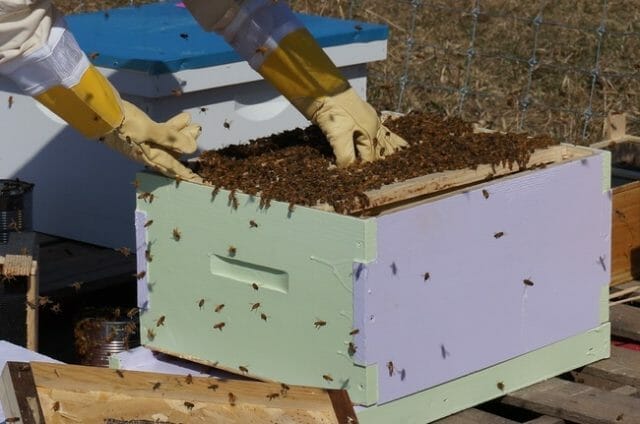
Beekeeping is often referred to as Apiculture. It is the process of maintaining the bee colonies using the manmade hives. Peoples are accumulating honey from the wild bees scene 10,000 years ago. History claims that people are into artificial Beekeeping from ancient age (9,000 years ago).
However, bee farming become popular after the invention of the movable comb hive (1768/1770). It shut down the destructive old skep-based beekeeping. The bees no longer had to be killed to harvest the honey
In this century, most of the honey we consume came from modern Beekeeping techniques.
Now, what is the modern way of keeping bees?
In the past century there been a lot of development. There occurred an evolution of hive designs.
Like bee farmers fo not use the traditional fixed comb hives. Instead, they use topbar & vertical stackable hives. In terms of protective clothing & smoking, it become more modernized too.
Now, in this era, there are mainly 3 types of bee farming-
- Natural beekeeping
This beekeeping movement practices in rural areas. It tends to use a variety of simple design top-bar hive (movable comb without the use of frames or a foundation).
- Urban or backyard beekeeping
Urban beekeeping is practiced in urban gardens. It usages modern types of beehives.
- Indoor beekeeping
It is about raising bees for honey in a controlled environment or in indoor hives.
How to Start Bee farming in 10 Simple Steps
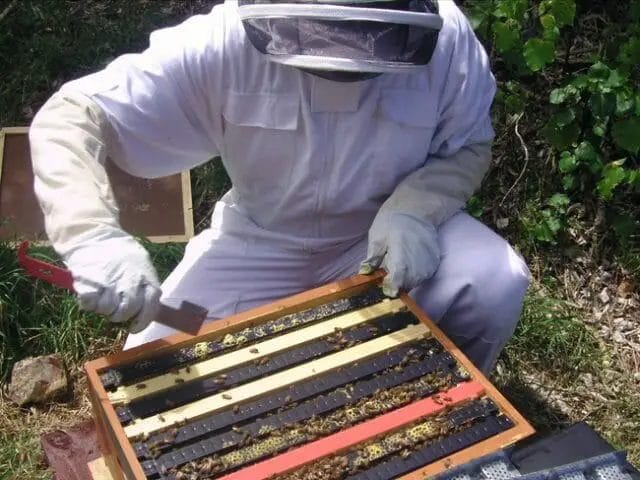
If you are interested in managing your bees, read on. Bees thrive far too much in a city than that in rural areas and it becomes a good thing. In the early spring, new hives are set up.
According to researchers at Tufts University: without bees, around one-third of our food system would disappear. (If you’re not interested in one day making your new climb into such a particular business, you can avoid booklets that concentrate on industrial honey production.)
The silver coin to the COVID-19 problem here is that most of the people are now getting more self-sufficient and live more sustainably and consume a little more.
In backyards, people cultivate food and raise pets. And with warmer temperatures, some people have turned to a new farm hobby: beekeeping. In the last few weeks, the interest and influx of potential beekeepers have grown for beekeepers’ organizations.
If you have a garden beekeeper, a hostess, or a small farmer who wishes to start a company in which to market honey and other bee items, the principles of beekeeping need to be demonstrated to the inexperienced. Learning how to keep bees is very easy following some easy steps.
Step 1: Learn All About Beekeeping
You have plenty of books to read about these cute little insects, and learning more about them will help you to launch your hives on the right foot. You’ll be trained to go and to know how to maintain bees as your bees arrive.
At this stage, you must ensure that – you have proper knowledge of these things.
Ecology
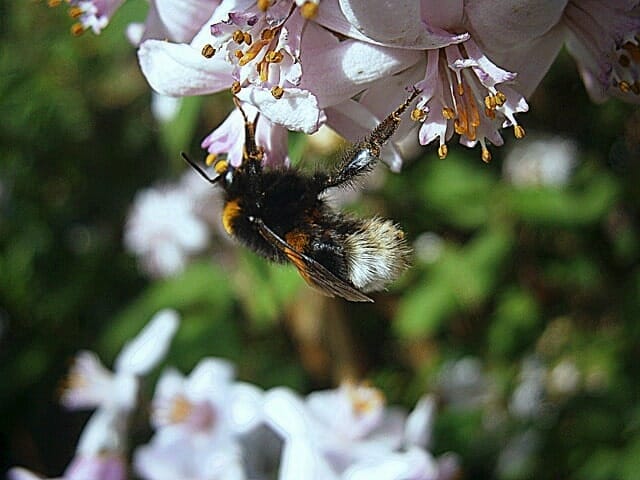
As an important part of the pollination system, honeybees and native bees are responsible for the effective seeding of more than 90% of all flowering plants and for the fruiting of 30% of our grain.
When foraging, bees are coated in pollen, and then groom the pollen on their legs into specialized structures called pollen baskets to return to the hive.
The nectar contains carbohydrates that can be stored and dehydrated into honey when combined with the enzymes in the honey gut.
The Queen
After 15 days of growth, the queen emerges from her cell and she stays in the hive for 3 to 7 days before venturing out on a mating flight.
Otherwise, mating flight is referred to as’ nuptial flight.’ The first orientation flight can only last for a few seconds, only enough to mark the hive’s location.
There is a chance for every fertilized egg to become a queen. Diet decides whether the bee will develop into a queen or a worker in the larval stage. Only royal jelly is fed to queens, a protein-rich secretion from the glands on the heads of young workers.
To built queen cells, queens are raised. The completely built queen cells have a shape and texture that is peanut-like. Queen cells start off as cups for queens.
Worker Bees
Female “worker” bees leave the hive every day to gather nectar and pollen during the warm times of the year.
Although no architectural or pollinating purpose is served by male bees, their main role is to mate with a queen bee. They fall to the ground if they are successful, and die after copulation. There is the ability for every fertilized egg to become a queen.
| Day | Work |
|---|---|
| 1–3 | Cells & incubation cleaning |
| 3–6 | Feeding older larvae |
| 6–10 | Feeding younger larvae |
| 8–16 | Receiving from field bees nectar and pollen |
| 12–18 | Producing beeswax and constructing cells |
| 14 + | Nectar, pollen, foraging water & propolis.Stealing other hives |
Drones
The biggest bees in the hive (except for the queen) are drones, almost twice the size of a worker bee. Note in the image that, probably to help locate the queen during the mating flight, they have much larger eyes than the workers have. They do not forage for pollen or nectar.
They have no other known purpose just to mate and fertilize them on their mating flights with new queens.
Feed and Nutrition
Honey bees require carbohydrates from nectar or honey, amino acids from pollen), lipids, vitamins, minerals, and water.
Step 2: Learn How Bees Make Honey
Before beginning a beekeeping journey, there are several things to weigh, however before you dive in, take into account whether it’s right to hold bees to you.
Let us step back and explain just how a hive works and what bees do before you hop in and start buying materials.
Bees form nests, fly to blossoms and collect nectar, and then bring the nectar back to the hive and pebble, eventually being sweet.
Step 3: Contact the Local Organizations those are Farming Bees
Details can be unique to your local region of beekeeping. The essence of beekeeping ensures that if you have good local support, someone will check your beekeeping stall or help you find your Queen, for instance, if appropriate. Get out, search, and hold sessions of the local beekeeping association. Any organizations have coaches who will support you in your first season to be invaluable.
Regional plants are the secret to a happy, safe colony and the most essential intelligence can be given by only local mentors. The website of the organization is a perfect starting point. You will communicate through mentoring, networking, Q&A sites, and perhaps low-cost rental equipment.
Step 4: Know How to Set Up the Hive Properly
You should have a beehive to maintain bees. In the wilderness, bees build their hives, sometimes on a hollow tree or in a sheltered location, but they can be everywhere. As an immigrant from backyards, you are providing your bees with a manmade hive for sustaining the colony and conveniently extracting the honey.
Now, you need to move the beehive often to adjust the heat form the sun.
The backyard or larger beekeeper has many different options. The most often encountered forms are Langstroth and top-bar hives.
Step 5: Learning Tasks for Beekeeping
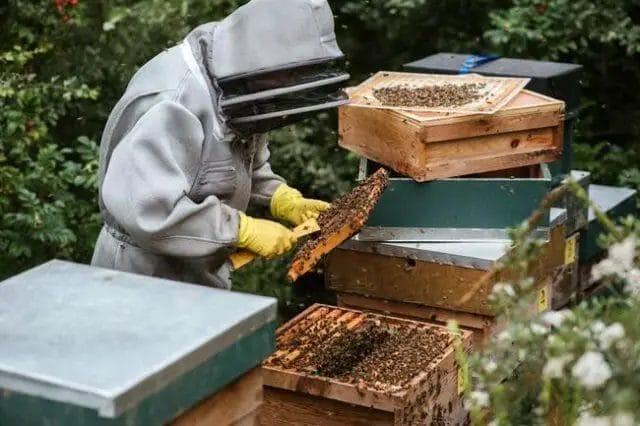
What does the handling of your bees necessitate? Beekeeping is often split by season, just like gardening. The perfect time to develop your hive is in spring so that when the construction you begin to create has time to lay the breeding ground (baby bees).
My key suggestion is to do more inquiries on beekeeping. I guess it’s the way people think of bees as creatures, while there is that mindset towards beekeeping. Here are some tips for you.
- Other farmers in the area can be harmful. For instance, it can propagate to other colonies if you want to let your hives get severely ill.
- If your colony does not do well, you cannot extract honey. But what happens sometimes to several colonies in the spring is that they are doing well and will make nice whether or not you search them, and then somehow they die in the autumn from the disease.
Step 6: Gather your Materials for Beekeeping
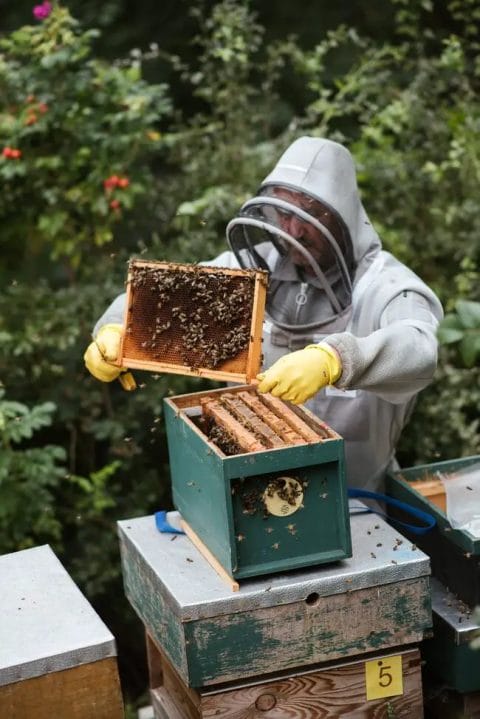
What do you still need to launch beekeeping? Read on what you can do without the necessary supplies right now. Know, start tiny, but if you change your views later you can make significant changes.
Some items are best bought directly, while others can be purchased from different online sources.
Be Tricky and Spend Less
Maybe it is just the tools you need that would be the main challenge to beginning a bee farm. This is a practical list of equipment for beekeepers:
- Hive boxes
- Bottomfeeder
- Top Spray bottle
- Queen catcher
- Trap with veil
- Queen Muff
- Hive tool
- Brush
- Extractor
- Smoker
- Catcher
Step 7: Create a Honey Bee Farming Business Plan
This step is optional for Hobby Beekeepers. However, it is the most crucial part of starting from nowhere.
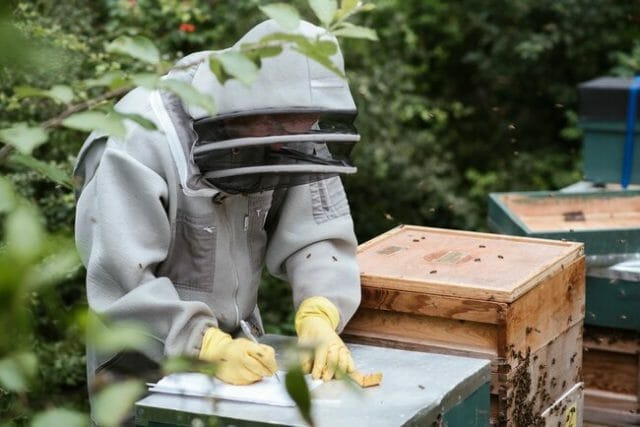
Here is a cheat sheet to make a business plan. You should take your time researching and creating a blueprint.
- SWOT Analysis –
- Strengths
- Weaknesses
- Opportunities
- Threats
- Reasons for Starting a Bee Farm – Why, Where, and How you Want to Start?
- Pick a Farming method – Traditional vs. Modern Methods.
- Initial Investment & Costing
- Marketing Opportunities Plan
- Operation plan
Step 8: Order your Bees from Trusted Sources
When you have collected your products, it’s time to purchase your bees! Beekeeping experience!
The colony of the nuc is a more developed set of bees with a Queen that has already begun to bring up a brood. The colonies are the “package bees” and a queen, and one “nuc colony.” If you can have one, it can bring your hive a huge advantage.
There some people called Queen breeders, who mostly sell queen bees to apiculturists. When sometimes you buy a Queen bee, then you can buy from them.
When you buy bees you would like to seriously look for a starter hive, which is also known as a colony of nuclei.
Local breeders would have bees suited to the climate. However, It is important to check them frequently to make sure they are safe when you get your bees.
Step 9: Choose the Location and Equipment Wisely
Would you use the normal beehive or would you like a top bar or beekeeper as your typical hive style?? You might need a veil, a vail jacket, or a full-body bee suit for securing equipment – what job is for you?
Your hive position will influence your bees by sunlight (summer v. winter), wind intensity, exposure, connectivity to neighbors, etc. Once created, it is an essential enterprise to transfer the hive. Where is your hive(s) going to locate? What other supplies do you need for beekeeping?
Search and Construct a Suitable Place for Bee farming
Are you prepared to begin? you need to thrive in a healthy environment for bees. Cities frequently provide ample shelter to make bees feel healthy. At the entrance to the hive, however, there is a smooth, sunny flight path to a partially open field.
Urban rooftops are an ideal spot to explore as far as future distractions like cars and sick dogs are involved. Wind protection without fully smothering air flows is offered by a clearing with surrounding trees or walls.
You can see that if you are not patient, you can spend a small fortune beginning a bee farm. That’s why you profit from purchasing used machinery for part of your business. Try to check online to find a well-washed coat, cast, and veil for even less than your brand new rivals. Per state does have various rules on selling and transporting used beekeeping tools, so look for local legislation with your government.
The resale equipment often needs to undergo an inspection and official notice is important sometimes.
Try setting up your beehive rather than getting new ones if you are crafty.
You’re on the route now! You’re able to welcome home your first family of bees while you get equipment and place and know how to get started on the journey of beekeeping.
Step 10: Organizing the Gathered idea and Preparing to start beekeeping
Once you know everything regarding beekeeping, you should get into the task right after that. Then, you will get to learn more through your experience in this field.
Beekeeping is one of the easiest ways to help the ecosystem and get in contact with the people as well. Best of all, almost everyone can consider starting doing this. While the majority of agricultural products need acreage, comprehensive expertise, and heavy machinery, it is in contrast cheap, easy, and convenient to begin a bee farm — not to mention it is very satisfying.
It’s necessary not to coat up the truth: you don’t have a faint heart to start your bee farm. When you are up and going, the bees do about everything you need to sit back and take advantage of the enjoyable benefits of owning a bee-hive. But acknowledge a learning curve and a plan to spend time, resources, and money in advance before then.
Initial Cost for Staring Bee Farm
The effective pollination of the crops by bees is a significant portion of food production in the United States. Families such as yours and mine grow up to make a difference for such a remarkable little bug in recent years as the colonies vanished. The apicultural revolution saves the bees, and it seems heroic to walk in the hobby for sure.
You want to wait for a full comb, which is just a means of collecting honey without a bee of the infant. That’s what you’d be collecting.
It’s like a costly hobby or a pricey business if you do it as a business. I assume that some people are overwhelmed. There will be about $150 or more to set up a bee box.
And then, according to where you are, the bees will cost between $150 and $300. If you need to replace your queen, often it costs between $20 and $50, but sometimes you have to just to pay overnight delivery.
The suitability for the bee itself is $100 to $200, plus many other tools.
Useful Tips for Beginners
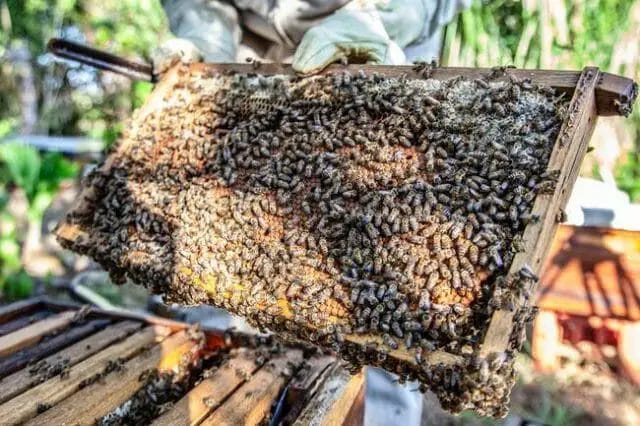
- It is an understatement to suggest that bees are remarkable. So it might be a disservice for the colony and yourself to get into a beekeeping activity without adequate knowledge.
- Proceed with research on your beekeeping quest. Talk to your family doctor and take a test of them to check any of the family members of your home carries out an allergy.
- This checks to avoid any allergic reactions long before the colony hits you.
- Look at the ongoing local laws of the city. Dust off your document for the Homeowners Association and find the cattle bylaws tab. You can be shocked to learn that certain societies support amateur apiculturists.
- You have to get in and sit back and observe the comb to learn which one you look at or what it entails. Look for a stable pattern of the brood.
- For beginners, it’s simple to see whether the larva gets cast over with an apiary capping at a certain phase in growth. If this colony is safe, you can see a close connection with this great patch of all larvae.
- It seems as though there are vacant cells if this were unsafe. It has been called a shotgun pattern which appears like a screwdriver. This unusual pattern in the brood nest would also occur. It won’t tell you what’s completely wrong or what to do with your colony.
- But at least this will warn you if something is wrong as well as a more professional beekeeper will make things easier for you.
- So usually the rule of thumb should not be to reap in the first year when you’re a new beekeeper. And that, since the colony has been brand new, might be what people are recommending. They didn’t have much time to establish themselves.
- You know when it’s finished because you look at the combs. After all, it’s capped until the sugar is ready.
Bottom Line
I encourage someone who would like to be a beekeeper to continue preparing for a year significantly before getting into the process.
The strongest beekeepers are those that have developed a passion and a love for bees. Concentrate on learning the way these bees thrive without a beekeeper to understand their behavior and genetics correctly.
And you know what is going on throughout the beehive before you decide to work on beekeeping techniques. Once you can have the grasp over the honeybee initially, you can then easily succeed far more. Hope you got a very clear idea of How to Start Bee Farming.

And I thought this was going to be a fun and easy hobby, but seems I was wrong. Geesh
it’s fun, however, there are a lot of things to learn. Once you have learned the basics, it will be fun.